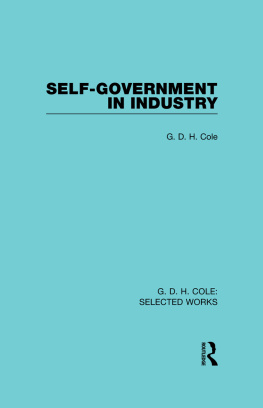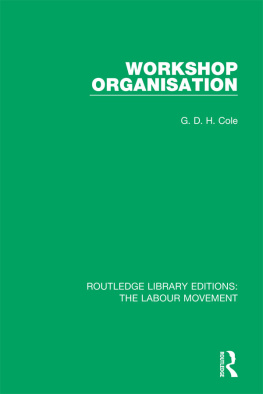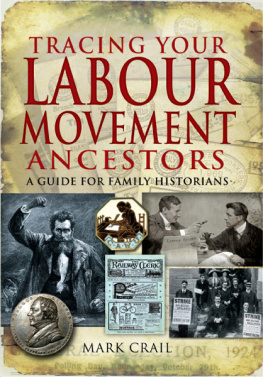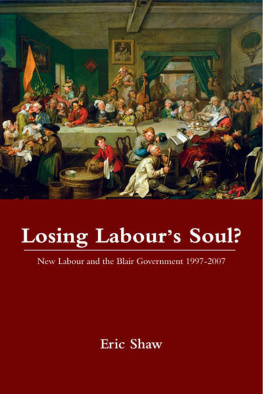First published in 1917
This edition first published in 2011
by Routledge
2 Park Square, Milton Park, Abingdon, Oxon, OX14 4RN
Simultaneously published in the USA and Canada
by Routledge
711 Third Avenue, New York, NY 10017
Routledge is an imprint of the Taylor & Francis Group, an informa business
1917 H A Cole
All rights reserved. No part of this book may be reprinted or reproduced or utilised in any form or by any electronic, mechanical, or other means, now known or hereafter invented, including photocopying and recording, or in any information storage or retrieval system, without permission in writing from the publishers.
British Library Cataloguing in Publication Data
A catalogue record for this book is available from the British Library
ISBN 13: 978-0-415-56651-3 (Set)
eISBN 13: 978-0-203-83931-7 (Set)
ISBN 13: 978-0-415-59730-2 (Volume 2)
eISBN 13: 978-0-203-83960-7 (Volume 2)
Publishers Note
The publisher has gone to great lengths to ensure the quality of this reprint but points out that some imperfections in the original copies may be apparent.
Disclaimer
The publisher has made every effort to trace copyright holders and would welcome correspondence from those they have been unable to trace.
Chapter I
The Control of Industry During and after the War
IN the midst of a war which has profoundly changed the economic, social and political life of the nations, men's minds are constantly turning to the thought of what is to come after the war. All sections of the community profess to realise the need for fundamental reconstruction: everyone says that no mere return to the conditions that prevailed before the war will meet the coming situation. But, though we all seem to be agreed on the need for reconstructing our national life, there is the widest possible divergence in the ideals that are being held up to us. One section, imbued with the idea of commercial supremacy and business government, bases all its plans for reconstruction upon the imminence of an international economic war no less bitter and intense than the present struggle of armed nations. Another is preaching the principle of international fellowship and co-operation, often without any clear idea of the basis upon which alone fellowship can securely rest.
It is to this second section that I make my appeal. To the apostles of national aggrandisement and economic strife between the nations I have nothing to say; for I realise that their ideal of domestic government is in direct opposition to my own. Their nationalism and their imperialism are based upon the capitalist system; their object is the aggrandisement of British capitalism; and the individual British citizen is to them no more than an instrument for the making of profits in the interest of national capitalism.
If these ideas are to be successfully opposed, those whom they disgust and appal must have to put against them a policy no less clear and coherent. Above all, it must be realised that our ideas of international relationships have the most intimate connection with our ideas of internal reconstruction, Jingoism and imperialism are essentially capitalistic, in that they rest upon an economic foundation, and are inspired by the desire of the profiteering classes for wider spheres of exploitation. True internationalism, on the other hand, must get its inspiration and its driving force from the internal condition of the nations themselves. Between states and nations whose domestic systems violate every principle of liberty, justice and democracy there can be no stable fellowship. Co-operation begins at home; and the hope of comity among the nations rests upon the establishment of industrial and political self-government in the states and societies of the civilised world.
When, therefore, we consider the problem of national reconstruction, we are well on the way to considering the establishment of world democracy. Our first business is to set our own house in order; our immediate task is to secure that the reconstruction after the war shall bring us nearer to establishing in our own country the principles of liberty and equality.
In this book, I am dealing only with a single aspect of this problem; but it is the aspect that seems to me most fundamental. The industrial system under which we live conditions and governs all the other activities of our community: our political and our social life are but the reflection of our national economic condition. In dealing, then, with industrial reconstruction, we are pointing the way to political and social changes of a revolutionary character; and these changes can only come about by way of a revolutionary change in industry itself. Political democracy is a farce and a pretence, because industrial autocracy remains almost unchallenged: the rise to power of a new class in industry will involve the overthrow of the ruling class in politics and in Society.
That the war has exercised a profound influence on industry no one is likely to deny; but as to the permanent effects of the change there are at least two opinions. The great capitalists see in the sacrifices of restrictions and powers which Trade Unions have made during the war an opportunity of strengthening capitalism by utilising new sources of cheap labour and by breaking the power of the Trade Union movement. Ample evidence of this is furnished by the recent Report of the Employers' Parliamentary Council, which advocates among other things the repeal of the Trades Disputes Act, the Factory Acts, and other industrial legislation, and a general offensive by the employing class against the Trade Unions. To this Council are affiliated, among other capitalist bodies, the master builders, the master printers and the Shipping Federation. Moreover, no one who reads regularly the big employers' journals can doubt that a general offensive is in preparation. These journals usually argue about the future of British industry on the virtual assumption that the abrogation of Trade Union rules will be permanent. Often they express a desire for more friendly relations with Labour, but usually on the basis of Labour's surrender. The capitalists have no intention of a permanent return after the war to pre-war conditions: the war has given them their chance, and the alacrity with which many of them have taken advantage of it is a clear indication of the course they mean to pursue in the future. Among the workers, on the other hand, there is a widespread distrust of the intentions of capitalism, and, in some quarters, the beginning of an alternative policy. As usual, however, the capitalists are far ahead of the workers: they have a coherent policy which they are even now putting into effect, while the workers are still at the most only groping their way towards a constructive alternative.
In the hope of helping the Labour movement in the formulation of a constructive policy, and of enlisting the sympathies of all those to whom a capitalistic and militaristic imperialism is abhorrent, I am putting forward in this book some general suggestions for industrial reconstruction. These suggestions are based upon the idea that the control of industry should be democratised; that the workers themselves should have an ever-increasing measure of power and responsibility in control, and that capitalist supremacy can be overthrown only by a system of industrial democracy in which the workers will control industry in conjunction with a democratised State. This is the system of National Guilds, and its dominant idea is that the individual worker must be regarded not simply as a ' hand/a decreasingly important adjunct to the industrial machine, but as a man among men, with rights and responsibilities, with a human soul and a desire for self-expression, self-government and personal freedom.













